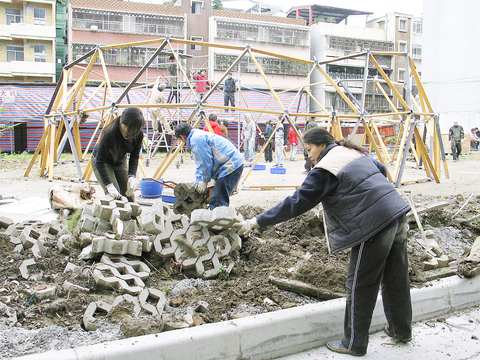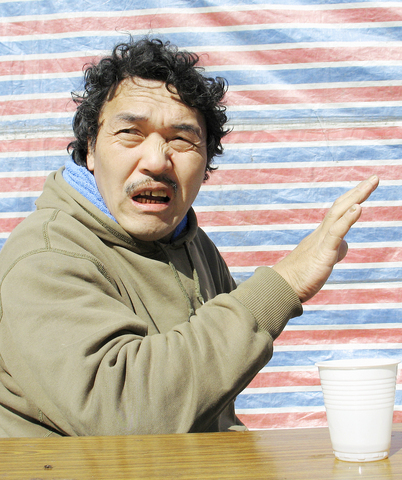Using Faust to address Taiwan's social problems may seem like quite a challenge, but that's exactly what a Japanese director plans to do in a tent theater next week.
For the past two weeks, 40 actors, musicians, lighting technicians, costume designers and a handful of Japanese structural engineers have been erecting the two-story tent that will house the stage and audience seating, off Tongan Street, near Guting MRT station.
During the day, the sawing and hammering attracts the stares of curious local residents passing by. At night, the actors take turns to sleep at the site to make sure nothing goes missing. After six performances starting on Wednesday, the tent will be taken down and the once-deserted land will be turned into a park.

PHOTOS: GRAHAM NORRIS, TAIPEI TIMES
Director Daizo Sakurai's Taiwan Faust is based, loosely, on the Johann Wolfgang Goethe story about a German who sells his soul to the devil. The drama is set in a graveyard for the countless people who pushed history forward but never became famous, whose names, Daizo says, make up a "white list."
Although he has been working on it for the past two years, Daizo was still finishing the story last week, but it appears there will be two Fausts and two Mephistopheles, and maybe some singing.
"I think Faustian people are the main element in modernization, so I would like to ask how Taiwan can deal with these kinds of people," he said at an open-air press conference while work continued on the tent in front of him.

He believes Taiwan's problems are related to the post-Cold War environment and Japan's influence from the period of colonization that ended in 1945.
"As a Japanese, I have Taiwan in my history because of the colonial period," he said.
The connection between Taiwanese people and the colonial period is the most important part of modernization here.
Daizo has been producing tent theater for more than 30 years in Japan, most recently with the Yasun no Tsuki group. In 2000, he was invited by Assignment Theater to be a co-director on a drama it was working on. He liked Taiwan so much he rented a house in Taipei County and now spends half his time there and the other half in Tokyo, where he runs a business producing crosswords for
magazines.
Even though the crew is all-volunteer, the production will still cost him more than NT$400,000, and it's unlikely he will get all the money back through ticket sales. Even so, he says he still prefers constructing unique sets for his productions because it allows him to be more creative.
"In theaters, there is a clear distinction between the actors on the stage and the audience, so imagination in theaters is confined by this relationship," he said.
The tent has been used before, but much of the set is being built from scratch, and includes a rotating stage, a tower and, according to the actors working on it, a surprise.
In a tent, the audience can decide more about what they want to happen. "They don't have to prepare anything, just make decisions," Daizo said mysteriously, adding he wanted to make people think about history to solve Taiwan's problems.
Even so he clearly doesn't want it to be too serious. "If the audience doesn't laugh 30 times, I will apologize," he said.
Performance notes:
What: Taiwan Faust
Where: Ln 109, Tongan Street, Taipei (台北市同安街109巷)
When: March 23 to March 28 at 7pm
Tickets: NT$380 in advance. (Send your name, telephone number, performance date and number of tickets to taiwanfaust2005@yahoo.com.tw, or call (02) 2367 1943, before March 21). NT$420 on the door.

Taiwan has next to no political engagement in Myanmar, either with the ruling military junta nor the dozens of armed groups who’ve in the last five years taken over around two-thirds of the nation’s territory in a sprawling, patchwork civil war. But early last month, the leader of one relatively minor Burmese revolutionary faction, General Nerdah Bomya, who is also an alleged war criminal, made a low key visit to Taipei, where he met with a member of President William Lai’s (賴清德) staff, a retired Taiwanese military official and several academics. “I feel like Taiwan is a good example of

March 2 to March 8 Gunfire rang out along the shore of the frontline island of Lieyu (烈嶼) on a foggy afternoon on March 7, 1987. By the time it was over, about 20 unarmed Vietnamese refugees — men, women, elderly and children — were dead. They were hastily buried, followed by decades of silence. Months later, opposition politicians and journalists tried to uncover what had happened, but conflicting accounts only deepened the confusion. One version suggested that government troops had mistakenly killed their own operatives attempting to return home from Vietnam. The military maintained that the

Before the last section of the round-the-island railway was electrified, one old blue train still chugged back and forth between Pingtung County’s Fangliao (枋寮) and Taitung (台東) stations once a day. It was so slow, was so hot (it had no air conditioning) and covered such a short distance, that the low fare still failed to attract many riders. This relic of the past was finally retired when the South Link Line was fully electrified on Dec. 23, 2020. A wave of nostalgia surrounded the termination of the Ordinary Train service, as these train carriages had been in use for decades

Lori Sepich smoked for years and sometimes skipped taking her blood pressure medicine. But she never thought she’d have a heart attack. The possibility “just wasn’t registering with me,” said the 64-year-old from Memphis, Tennessee, who suffered two of them 13 years apart. She’s far from alone. More than 60 million women in the US live with cardiovascular disease, which includes heart disease as well as stroke, heart failure and atrial fibrillation. And despite the myth that heart attacks mostly strike men, women are vulnerable too. Overall in the US, 1 in 5 women dies of cardiovascular disease each year, 37,000 of them